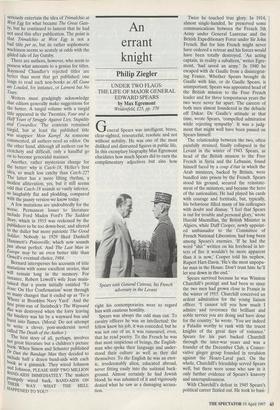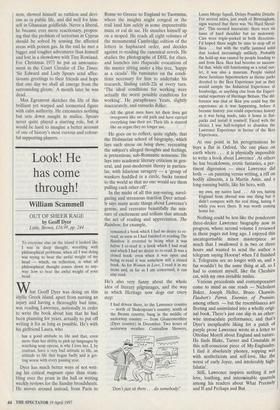Al errant knight
Philip Ziegler
UNDER TWO FLAGS: THE LIFE OF MAJOR GENERAL EDWARD SPEARS by Max Egremont Weidenfeld, £25, pp. 370 General Spears was intelligent, brave, clear-sighted, resourceful, resolute and not without nobility. He was one of the most disliked and distrusted figures in public life. In this exemplary biography Max Egremont elucidates how much Spears did to earn the complimentary adjectives but also how Spears with General Catroux, his French adversary in the Levant right his contemporaries were to regard him with cautious hostility.
Spears was always the odd man out. To cavalry officers he was an intellectual: the fellow knew his job, it was conceded, but he was not one of us; it was rumoured, even, that he read poetry. To the French he was that most suspicious of beings, the English- man who spoke their language and under- stood their culture as well as they did themselves. To the English he was an exot- ic, irredeemably alien, educated abroad, never fitting easily into the national back- ground. Almost certainly he had Jewish blood; he was ashamed of it and vigorously denied what he saw as a damaging accusa- tion. Twice he touched true glory. In 1914, almost single-handed, he preserved some communications between the French 5th Army under General Lanrezac and the British Expeditionary Force under Sir John French. But for him French might never have ordered a retreat and his forces would have been totally destroyed. 'An acting captain, in reality a subaltern,' writes Egre- mont, 'had saved an army.' In 1940 he escaped with de Gaulle from a disintegrat- ing France. Whether Spears brought de Gaulle with him, or de Gaulle Spears, is unimportant; Spears was appointed head of the British mission to the Free French leader and for three tempestuous years the two were never far apart. The careers of both men almost foundered in the debacle off Dakar. De Gaulle's attitude at that time, wrote Spears, 'compelled admiration while rejecting sympathy'. It was a judg- ment that might well have been passed on Spears himself.
The relationship between the two, often painfully strained, finally collapsed in the Levant in the winter of 1943. Spears, as head of the British mission to the Free French in Syria and the Lebanon, found himself faced by a coup d'etat in which the Arab ministers, backed by Britain, were bundled into prison by the French. Spears stood his ground, secured the reinstate- ment of the ministers, and became the hero of the nationalists. He had played his cards with courage and fortitude, but, typically, his behaviour filled many of his colleagues with doubt and dismay. 'I feel that Spears is out for trouble and personal glory,' wrote Harold Macmillan, the British Minister in Algiers, while Duff Cooper, newly appoint- ed ambassador to the Committee of French National Liberation, had long been among Spears's enemies. 'If he had the word "shit" written on his forehead in let- ters of fire it wouldn't be more apparent than it is now,' Cooper told his nephew, Rupert Hart-Davis. 'He's the most unpopu- lar man in the House. Don't trust him: he'll let you down in the end.'
Spears survived because he was Winston Churchill's protégé and had been so since the two men had grown close in France in the winter of 1915. Churchill conceived an ardent admiration for the young liaison officer. 'I cannot tell you how much I admire and reverence the brilliant and noble service you are doing and have done for the country,' he wrote. 'You are indeed a Paladin worthy to rank with the truest knights of the great days of romance.' Spears for his part backed Churchill through the inter-war years and was a founder of the December Club, a Conser- vative ginger group founded in revulsion against the Hoare-Laval pact. On the whole, Churchill's friendship served Spears well, but there were some who saw in it only further evidence of Spears's knavery and unscrupulousness.
With Churchill's defeat in 1945 Spears's political career fizzled out. He took to busi- ness, showed himself as ruthless and devi- ous as in public life, and did well for him- self in Ghanaian goldfields. Never a liberal, he became ever more reactionary, propos- ing that the problem of terrorism in Cyprus should be solved by sousing the affected areas with poison gas. In the end he met a bigger and tougher adventurer than himself and lost in a showdown with Tiny Rowland. For Christmas 1973 he put an announce- ment in the Court Circular of The Times: 'Sir Edward and Lady Spears send affec- tionate greetings to their friends and hope that one day we shall all emerge from the surrounding gloom.' A month later he was dead.
Max Egremont sketches the life of this brilliant yet warped and tormented figure with calm authority. He extenuates nothing but sets down naught in malice. Spears never quite played a starring role, but it would be hard to imagine a better account of one of history's most curious and colour- ful supporting players.



































































 Previous page
Previous page